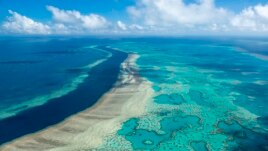14 August, 2024
New research shows that water temperatures in and around Australia's Great Barrier Reef have risen to their warmest in 400 years over the past 10 years. The rising temperatures have put the world's largest reef under threat.
The Great Barrier Reef is the world's largest living ecosystem. It stretches for 2,400 kilometers off the coast of the northern state of Queensland.
A group of scientists at universities across Australia removed core samples from the coral. They examined the samples to measure summer ocean temperatures going back to the year 1618. The scientists combined information from core samples with ship and satellite data going back around 100 years.

In this photo provided by the Great Barrier Reef Marine Park Authority the Hardy Reef is viewed from the air near the Whitsunday Islands, Australia, June 22, 2014. (Jumbo Aerial Photography/Great Barrier Reef Marine Park Authority via AP)
The results show that ocean temperatures were unchanged for hundreds of years. But starting in 1900, the ocean temperatures began to rise. The research found that this is the result of human influence.
From 1960 to 2024, the study's writers observed an average yearly warming for January to March of 0.12 degrees Celsius per decade.
Since 2016, the reef has experienced five summers of mass coral bleaching. This is when large parts of the reef turn white due to heat stress. This also puts the coral at greater risk of death. The mass bleaching events happened during five of the six warmest years in the last four centuries, the study showed.
This research appeared on August 8 in the publication Nature.
"The world is losing one of its icons," said Benjamin Henley. He is with the University of Melbourne and is one of the study's co-writers.
"I find that to be an absolute tragedy. It's hard to understand how that can happen on our watch in our lifetime. So it's very sad,” Henley added.
The last temperature measurement, from January to March of this year, was the highest on record. Henley added that it was "head and shoulders" above any other year, meaning it was much higher.
Coral reefs are important for many reasons. They protect shorelines from erosion. They are home to thousands of kinds of fish. And they are an important part of the tourism industry in many countries. In Australia, the Great Barrier Reef adds $4.2 billion to the economy each year.
At least 54 countries and areas have experienced mass bleaching of their reefs since February 2023, as climate change warms the ocean's surface waters. That information comes from the U.S. National Oceanic and Atmospheric Administration.
I'm Anna Matteo.
Alasdair Pal reported this story for Reuters News Agency from Sydney, Australia. Anna Matteo adapted it for VOA Learning English.
_____________________________________________
Words in This Story
ecosystem – n. a system made up of an ecological community of living things interacting with their environment especially under natural conditions
data – n. factual information (such as measurements or statistics) used as a basis for reasoning, discussion, or calculation
decade – n. a period of 10 years
heat stress – n. sustained, warmer-than-average ocean temperatures
icon – n. a person or thing widely admired especially for having great influence or significance in a particular sphere
absolute – adj. free from doubt : having no exceptions
erosion – n. the process of wearing away by the action of water, wind, or glacial ice
tourism – n. the practice and business of traveling for recreation